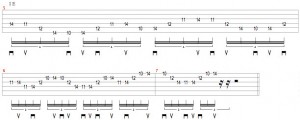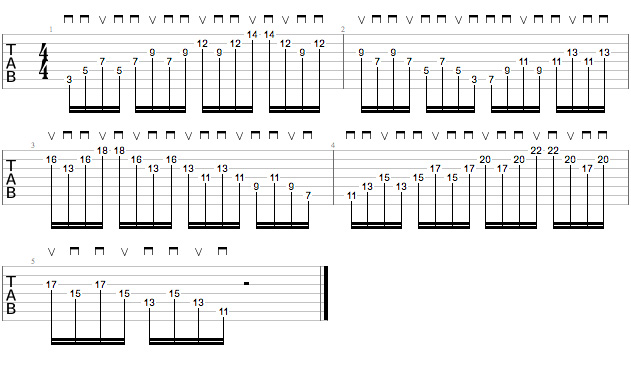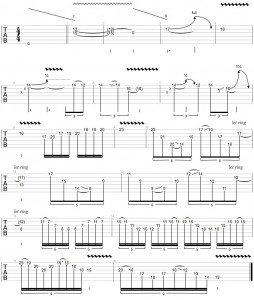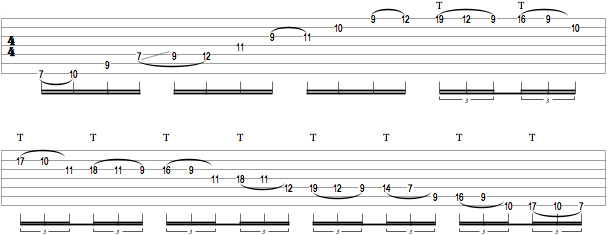
Derek Sherinian’s Mythology
Welcome to my second column/lesson! This month I’d like to talk about one of my favorite players of all time – Allan Holdsworth. He’s been a big influence in the electric guitar world, and has helped expand the musical vocabulary of countless players throughout the last three decades. Allan has always tried to push the physical and harmonic limits of his playing/instrument, and over the years has practically created his own language on the instrument and in the genre of fusion. Holdsworth represents everything that is good in the realm of guitar: from his impeccable time and touch, to his completely unique tone and singing lines. Much has been written in regards to Allan’s original dream of playing a horn, and his fight to make the guitar sound closer to the horn players he grew up idolizing, amongst them jazz giant John Coltrane.
For this month I will be playing his solo from the song “Day of the Dead,” featured on Derek Sherinian’s solo album “Mythology” (2004). The goal of this column will be to break down some of those lines, and talk about how they relate to the harmony Allan is approaching. This will clearly demonstrate how much Allan can bring to a rather simple progression with his masterly rhythmic and harmonic vocabulary.
By not being provided much to play over (in this case mostly a simple vamp), Allan is free to imply the chords he wants and really let’s loose on an improvised solo that practically sums up why so many players admire his command of the instrument and creativity. This solo is a great example for all players focusing on Rock playing in general, because it shows how much one can really do over a simple vamp. For other great examples of Allan playing over one chord vamps take a look at his solos in these two songs: “Joint Ventures” and “Devil Take the Hindmost.” Thanks to Charlie Shaughnessy for letting me use his transcription of this great solo.
Complete Solo
Click HERE to download a PDF of the complete transcription.
DoTD Full solo
Analysis
The first line we are going to break down (mm. 1-3) is based on the D Phrygian Dominant scale (1 b9 3 4 5 b13 b7). It starts on a C natural (b7) and the phrase then descends in quarter note triplets across the next two bars ending on an Eb(b9). Notice how Allan lets the phrase breathe with the wide open phrasing and his rhythmic control – By starting and ending the phrase on off-beats, the sense of predictability is lost.
DoTD 1st Line

The second line (mm. 11-12) starts off around a D Melodic Minor line (1 2 b3 4 5 6 7) – Again Allan avoids the downbeat! Further, notice how Allan ends the phrase in bar 11 with a chromatic line that when compared to the vamp gives us both the b6, the natural 6, the b7, and the natural 7. While it can be heard as a simple chromatic line, the harmonic ambiguity it sets up seems to have been very much intentional. In bar 12 Holdsworth concludes the phrase in the D natural minor mode (1 2 b3 4 5 b6 b7), another color to highlight the harmonic ambiguity of the line that preceded it – typical Holdsworth!
DoTD 2nd Line

The third phrase (mm. 14-16) is based on the D Phrygian scale (1 b2 b3 4 5 b6 b7). Once again you can see Allan refusing to highlight only one harmonic possibility for the vamp he is playing over, choosing instead to color the simple vamp with phrases that imply more harmonic motion than is really there. For this lick Allan is using very wide intervallic lines via string skips – something very common to his playing. Notice again how he avoids the downbeat when starting a phrase. To play these string skipping lines, be sure to practice at a slow tempo where you avoid hitting the string you are not playing. Allan ends this phrase in the first beat of measure 16 with a lick from hell! – A double string skipped line that finishes outlining D Phrygian. Once again, take care to play these lines in time and with precision.
DoTD 3rd Line

Another string skipping idea is used throughout measures 20-24 where the scales used are: D Phrygian for the first 3 measures, D Phrygian Dominant for the 4th measure and D Half/Hole Diminished for the 5th measure. Notice the almost Rubato feel the phrases have, always with such a smooth and efficient execution. This line ends in measure 25, where the vamp changes to G. Allan stops on the same note allowing it to sing a bit, showing the clear change in harmony by sitting on the root for a few moments.
DoTD 4th Line

Mm. 25-27 is our next phrase of interest – it is implying a Dominant chord that cannot be looked at as a single scale. Allan is outlining an 8 note synthetic scale, which includes both b9 and #9 – (1 b2 #9 3 4 5 b6 b7). It’s best to look at this as a G Phrygian Dominant scale with an added #9. The phrase ends with a chromatic descending line that resolves on G natural (root). Allan seems to have been adding more and more tension to each phrase as the solo progresses – this last line seems to be the tensest line of the solo, capitalizing on the ambiguity of the implied dominant chord.
DoTD 5th Line

The vamp changes back to a D chord in measure 29, which is followed by another huge string skipping line which utilizes the Whole Tone scale (1 2 3 #4 #5 #6) for the first 8 notes, and changes to a D Lydian Dominant scale (1 2 3 #4 5 6 b7) for the remainder of the phrase, ending on a tritone against the D (#4). This is one of the hardest phrases to play in the solo, but at the same time one of the most rewarding ones. Simply put, it’s a beautiful line full of color and it really opens up the sound of the vamp by taking us to a place we did not expect to go to.
DoTD 6th Line

The last fast run (mm. 33-34) is over an E chord, and uses an E Dominant b13 scale (1 2 3 4 5 b6 b7 – 5th mode of melodic minor aka the Hindu Scale) with some chromatic passing tones, which appear towards the end of the descending 3rd’s lick. He ends the phrase on the b13 of the E vamp. This falling 3rd’s sequence is rather hard to play in time and well articulated – one of Allan’s signature lines which involving great finger independence and dexterity.
DoTD 7th Line

Take a moment to consider how much ground Allan covered on such a simple and static vamp, and dive deep into Allan’s note choice and amazing sense of time – there are many rewarding lessons to be learned in doing so. I want to thank you all for reading my column, and I will hopefully see you next time, until then!
















